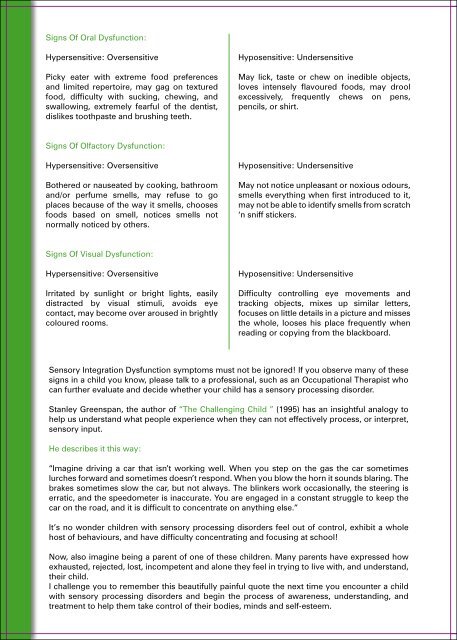PDA_Booklet
PDA_Booklet
PDA_Booklet
You also want an ePaper? Increase the reach of your titles
YUMPU automatically turns print PDFs into web optimized ePapers that Google loves.
Signs Of Oral Dysfunction:<br />
Hypersensitive: Oversensitive<br />
Picky eater with extreme food preferences<br />
and limited repertoire, may gag on textured<br />
food, difficulty with sucking, chewing, and<br />
swallowing, extremely fearful of the dentist,<br />
dislikes toothpaste and brushing teeth.<br />
Signs Of Olfactory Dysfunction:<br />
Hypersensitive: Oversensitive<br />
Bothered or nauseated by cooking, bathroom<br />
and/or perfume smells, may refuse to go<br />
places because of the way it smells, chooses<br />
foods based on smell, notices smells not<br />
normally noticed by others.<br />
Signs Of Visual Dysfunction:<br />
Hypersensitive: Oversensitive<br />
Irritated by sunlight or bright lights, easily<br />
distracted by visual stimuli, avoids eye<br />
contact, may become over aroused in brightly<br />
coloured rooms.<br />
Hyposensitive: Undersensitive<br />
May lick, taste or chew on inedible objects,<br />
loves intensely flavoured foods, may drool<br />
excessively, frequently chews on pens,<br />
pencils, or shirt.<br />
Hyposensitive: Undersensitive<br />
May not notice unpleasant or noxious odours,<br />
smells everything when first introduced to it,<br />
may not be able to identify smells from scratch<br />
‘n sniff stickers.<br />
Hyposensitive: Undersensitive<br />
Difficulty controlling eye movements and<br />
tracking objects, mixes up similar letters,<br />
focuses on little details in a picture and misses<br />
the whole, looses his place frequently when<br />
reading or copying from the blackboard.<br />
Sensory Integration Dysfunction symptoms must not be ignored! If you observe many of these<br />
signs in a child you know, please talk to a professional, such as an Occupational Therapist who<br />
can further evaluate and decide whether your child has a sensory processing disorder.<br />
Stanley Greenspan, the author of “The Challenging Child ” (1995) has an insightful analogy to<br />
help us understand what people experience when they can not effectively process, or interpret,<br />
sensory input.<br />
He describes it this way:<br />
“Imagine driving a car that isn’t working well. When you step on the gas the car sometimes<br />
lurches forward and sometimes doesn’t respond. When you blow the horn it sounds blaring. The<br />
brakes sometimes slow the car, but not always. The blinkers work occasionally, the steering is<br />
erratic, and the speedometer is inaccurate. You are engaged in a constant struggle to keep the<br />
car on the road, and it is difficult to concentrate on anything else.”<br />
It’s no wonder children with sensory processing disorders feel out of control, exhibit a whole<br />
host of behaviours, and have difficulty concentrating and focusing at school!<br />
Now, also imagine being a parent of one of these children. Many parents have expressed how<br />
exhausted, rejected, lost, incompetent and alone they feel in trying to live with, and understand,<br />
their child.<br />
I challenge you to remember this beautifully painful quote the next time you encounter a child<br />
with sensory processing disorders and begin the process of awareness, understanding, and<br />
treatment to help them take control of their bodies, minds and self-esteem.


